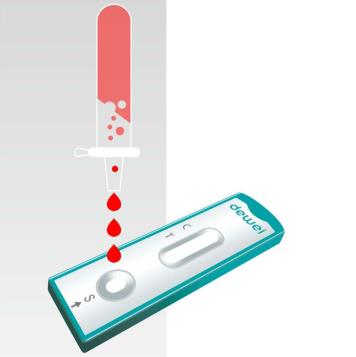Home Use 15mins Reading POCT Covid 2019-NCoV Antigen Rapid Swab Test Kit
² Fast: 15 Minutes
² Easy: One Step
² Convenient: Swab sample collection
² Cheap: Lower cost with high efficiency
INTEND USE OF ANTIGEN RAPID TEST
The rapid test kit is used for qualitative determination of novel coronavirus (SARS-CcV-2) antigen in human nasal swab samples in vitro.. This kit is offered to clinical laboratories and healthcare workers for point-of-care testing, and not for at home testing, in compliance with Section IV.D. of the FDA’s Policy for COVID-19 Diagnostic Test. Single Package could be home used.
MAIN COMPONENTS OF ANTIGEN RAPID TEST
• Test Cassette.
• Extraction Tube.
• Extraction Reagent.
• Swab.
STORAGE & STABILITY OF RAPID TEST
• Store at 2 ~ 30 º C in the sealed pouch up to the expiration date.
• Keep away from direct sunlight, moisture and heat.
• DO NOT FREEZE.
HOW TO PERFORM THIS RAPIDTEST?
1. Remove a Test Device from the foil pouch by tearing at the notch and place it on a level surface.
2. Holding Extraction Reagent bottle vertically, add 10 drops (400μL) to the Extraction tube.
3. Insert the nasopharyngeal (and oropharyngeal) swab sample(s) into the extraction solution, then, mix the swab 10 times.
4. Remove the swabs while pressing against the solution tube in order to extract most of the specimen
5. Place the dropper cap and drop 3 drops (60~70μl) into the sample well.
6. Read the result in 10-15 minutes. Do not read results after more than 20 minutes.
Something you need to learn about:
1) What is the difference between an antigen test and a molecular test?
An antigen test detects specific proteins on the surface of the virus. These tests are quicker and less expensive, but have a higher chance of missing an active infection, according to the FDA.
A molecular (PCR or polymerase chain reaction) test detects the virus’s genetic material. These tests require a more complex technology to get results, and it usually takes a day or two to get those results (depending on lab capacity, results may take up to a week).
If an antigen test shows a negative result and you have reason to believe you may have the virus (because of symptoms or exposure), your doctor may order a molecular test to confirm the results.
2) Which tests are more accurate?
No test is 100% accurate, but the molecular tests are considered to be more accurate than the antigen tests, according to available research.
According to the FDA, an antigen test cannot “definitively rule out active coronavirus infection,” but positive results are “highly accurate” (negative results may require a confirmation test).
Harvard Medical School wrote in August that the reported rate of false negatives with molecular testing is as low as 2% and as high as 37%. A molecular test using a deep nasal swab will have fewer false negative results than samples from throat swabs or saliva, they say.
For antigen testing, Harvard noted that the reported rate of false negative results can be as high as 50%, but that the FDA has granted emergency use authorization for a more accurate antigen test.
In general, some of the issues that may affect the accuracy of a test include ineffective swabbing, contamination or mishandling of the sample, or problems with the testing chemicals, according to the FDA.
3) If antigen tests are less accurate, why would we use them?
Experts say the value in the rapid antigen tests is in the frequency of the testing rather than the accuracy, with repeated testing recommended. According to Science, getting a false negative in an antigen test two or three times in a row is rare. This strategy lines up with the NPR report mentioned above, which would employ daily testing of those in high-risk areas.
4) When should you perform Dewei COVID-19 Ag Rapid Test?
The COVID-19 Ag Rapid test should NOT be used for diagnosis of COVID-19 infection. Any individual who is symptomatic or a contact of a confirmed case should be directed to their healthcare provider, an assessment centre, or participating licensed community lab to seek PCR testing.
bio-equip.cn




